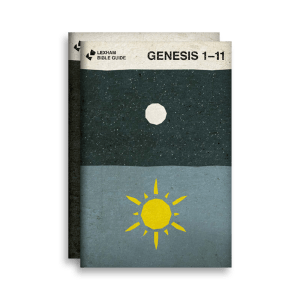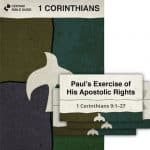
Much debate surrounds the first few chapters of the Bible. What were the days of creation? Should they be interpreted as 24-hour days or as longer periods of time? Were there any gaps of time between the days? Such questions provoke a multitude of answers. But resources on the subject tend to only provide a single point of view?the one held by the work?s author.
What if you wanted to survey all the major views held by various theologians? That?s where the Lexham Bible Guides really shine. They summarize different perspectives for controversial texts, and they link to other resources within the Logos library for further study. Here?s an excerpt from the Lexham Bible Guide: Genesis 1?11:
One of the most polarizing disagreements among Christian interpreters of Gen 1 is whether God created the world in six literal 24-hour days. The literal interpretation of Gen 1 sees the passage as clearly describing six 24-hour days. But the first three ?days? pass without the sun and moon to mark the day and night (Gen 1:14), opening up the possibility that ?day? was not meant literally. The Hebrew word for ?day? can have several different nuances in context. Different senses appear in this first chapter of Genesis (e.g., day as daytime in Gen 1:5), so other theories have been offered to explain the possible non-literal sense of ?day? here. The most popular alternatives are the punctuated activity view (each 24-hour creation day was separated by an indefinite period of time), the gap view (an indefinite lengthy time gap intervenes between Gen 1:1 and Gen 1:2), the day-age view (each creation day represents a geological age), the framework view (the days are a literary device structuring the creation account), and the analogical day view (the creation day is God?s work day, which is not necessarily equal to a literal 24-hour day) (Hughes 2004, 23?24).
-
Robert Gurney offers a defense of the young earth creationist interpretation, taking the days of creation as six literal 24-hour days.
?Does It Matter?? Six Day Creation: Does It Matter What You Believe? -
Victor Hamilton?s commentary carefully explains the three major interpretive options: the literal 24-hour day, the day-age theory, and the literary framework theory. Hamilton?s preference is a literary reading of Gen 1 with an analogical understanding of the days of creation.
?The ?Days? of Genesis 1? The New International Commentary on the Old Testament: The Book of Genesis, Chapters 1?17 -
R. Kent Hughes lists six different possible interpretations of the days of creation. He admits only one can be correct but cautions against letting the issue become a point of division among believers. He argues for the analogical view?that the days are God?s workdays, which are analogous with earth days but not necessarily the same as literal 24-hour days.
?Genesis 1:3?13? Preaching the Word: Genesis?Beginning and Blessing -
John Lennox has an old earth creationist perspective but discusses the options for understanding the days of creation as literal 24-hour days, as undefined lengths of time (day-age), or as a literary framework. His conclusion is a form of the punctuated activity view, in which long spans of time separate the literal 24-hour days of creation.
?But Is It Old? The Days of Creation? Seven Days that Divide the World: The Beginning according to Genesis and Science -
Hugh Ross believes in an old earth and that ?days? represent ages or epochs of time. He explains how this view is not incompatible with Genesis.
?Introduction: The Dawn of a New Day? A Matter of Days: Resolving a Creation Controversy -
John Walton accepts that the days of creation could be 24-hour days, but he argues that God is creating functions not matter during the week of creation. By the end of the week, He takes up residence in His cosmic temple.
?Gen 1:1?31? The NIV Application Commentary: Genesis
* * *
Right now, the two-volume Lexham Bible Guides: Genesis Collection is on sale! Through Friday, you can save 25% while gaining valuable perspectives on the entire book of Genesis.
Don?t wait?enhance your understanding of Genesis today!






